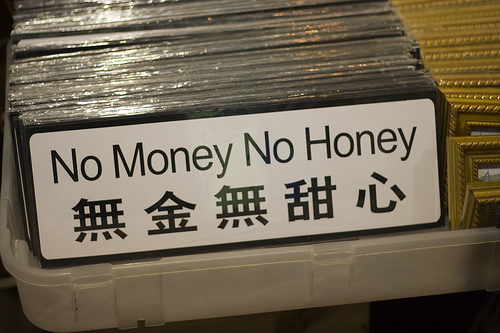
Photo Credit: Creative Commons
Whether traveling cross-country or across continents, the thought of running out of money while away from home is a nightmarish one; however, many travelers will find themselves in just this situation at some point in their globetrotting lives. The best way to avoid such a predicament is to make sure that there is plenty of readily accessible cash at-hand, whether it is in the form of traveler’s checks or on prepaid debit cards. Carry multiple forms of money and spread it around, storing it in luggage and in a wallet or, preferably, a secure travel bag or money-belt that fits under a jacket or shirt. Have at least one credit card reserved for use in emergencies or to purchase airline tickets.
Even the best-prepared of travelers may still find themselves in a situation where they are penniless and in an unfamiliar place. The best way to deal with such a problem is to avoid panicking and instead sit quietly and go through the options available.
“Out of money”
There are basically two ways that a traveler can be out of money; either there is absolutely no money at all, either on their person or in their bank account, or the individual has money, but it is simply not accessible for some reason.
If the traveler finds him or herself in the first situation, there are a couple of options available. The first is repatriation, which involves going to the nearest United States Embassy or Consulate, filling out the appropriate paperwork and basically asking for the U.S. Government to pay for a trip home. This is on the understanding that the cost will be repaid in full once the traveler is back in the USA. The second option is to find work of some kind. This can be complicated and time-consuming, particularly if the traveler is in another country and does not already have all the paperwork and permissions needed to take employment there. Getting a job in a foreign country also means staying there for some time in order to earn enough to come home; it is therefore likely to involve having to find somewhere to live.
A popular option with backpackers is staying in hostels. Well-known for their low-cost accommodations, they will often allow guests to work for their room and, to some degree, their board costs. This might therefore be a good option for the interim if either repatriation or seeking employment is to be pursued.
Getting money from home
If the traveler has money, but for some reason cannot access it, there are ways of getting funding from back home. The bank may be contacted if an ATM card or debit is card is stolen or damaged and they may be able to work out a method of getting money to the traveler through a wire transfer. Contacting the bank immediately after the card is stolen or damaged is, of course, essential.

